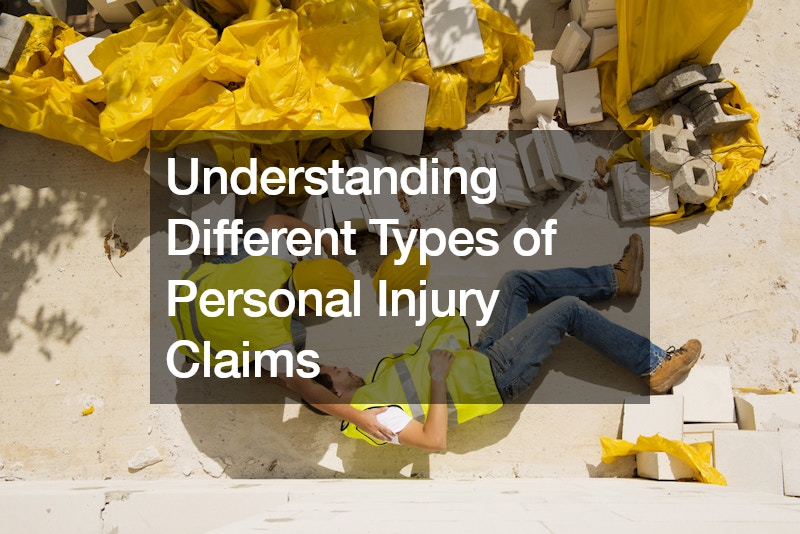
In this comprehensive exploration, we delve into the multifaceted realm of personal injury claims, providing insight into the various scenarios individuals may encounter. By unraveling the complexities of these claims, individuals can arm themselves with the knowledge necessary to navigate the legal landscape effectively and safeguard their rights.
What is Personal Injury?

Personal injury encompasses a broad spectrum of physical, emotional, and psychological harm inflicted upon an individual due to the negligence or intentional actions of another party. At its core, personal injury law seeks to provide recourse for those who have suffered harm through no fault of their own. From local car accidents to workplace incidents, personal injury claims arise from a myriad of circumstances, each necessitating a tailored approach to legal resolution.
Definition of Personal Injury
Personal injury, within the legal context, refers to any harm inflicted upon an individual’s body, mind, or emotions as a result of negligence or intentional wrongdoing by another party. This can encompass a wide range of scenarios, from motor vehicle accidents to medical malpractice and beyond. The crux of personal injury law lies in providing recourse and compensation to those who have suffered harm due to the actions or inactions of others. You may need car accident injury attorneys.
Common Causes of Personal Injury
Personal injuries can stem from various sources, ranging from everyday occurrences to catastrophic events. Local car accident lawyers often handle cases arising from traffic collisions, while slip and fall accidents account for a significant portion of personal injury claims. Additionally, instances of medical malpractice, workplace injuries, and product defects can all give rise to valid claims for compensation.
Importance of Seeking Legal Help

Navigating the complexities of personal injury law can be daunting, especially for those grappling with the physical and emotional toll of their injuries. Seeking the guidance of a seasoned attorney specializing in personal injury matters can make all the difference in securing a favorable outcome. From gathering evidence to negotiating with insurance companies, a skilled attorney can advocate for the rights and best interests of the injured party. An accident injury lawyer can help!
Types of Personal Injury Claims
Personal injury claims span a wide array of circumstances, each presenting its own set of legal considerations and challenges. Motor vehicle accidents, including those involving trucks and motorcycles, are among the most common types of personal injury claims. Slip and fall accidents, occurring on both public and private property, also give rise to numerous claims each year. Additionally, cases of medical malpractice, where healthcare professionals breach their duty of care, constitute a significant portion of personal injury litigation. Be sure to work with an experienced personal injury law firm!
Motor Vehicle Accidents
Motor vehicle accidents are a leading cause of personal injury claims, with thousands of individuals sustaining injuries on the roads each day. From fender-benders to catastrophic collisions, these incidents can have devastating consequences for those involved. Seeking the counsel of a seasoned semi accident lawyer is crucial for navigating the complexities of insurance claims, determining liability, and pursuing fair compensation for damages.
Slip and Fall Accidents
Slip and fall accidents, though seemingly mundane, can result in serious injuries ranging from broken bones to traumatic brain injuries. Property owners have a legal obligation to maintain safe premises and warn visitors of potential hazards. When they fail to uphold this duty, resulting in injury to others, they may be held liable for damages. An experienced personal injury attorney can assess the circumstances surrounding the accident and determine the viability of a claim for compensation. Work with personal injury lawyers!
Medical Malpractice

Cases of medical malpractice arise when healthcare professionals deviate from the accepted standard of care, resulting in harm to patients. From surgical errors to misdiagnoses, instances of medical negligence can have life-altering consequences for patients and their families. Consulting with a knowledgeable medical malpractice lawyer is essential for navigating the complexities of these cases, gathering evidence of negligence, and pursuing just compensation for damages.
How to Determine Liability
Establishing liability is a critical aspect of any personal injury claim, as it determines who is responsible for compensating the injured party. Liability can stem from various legal theories, including negligence, strict liability, and intentional wrongs.
Negligence
Negligence occurs when a party fails to exercise reasonable care, resulting in harm to another individual. To establish negligence, the injured party must demonstrate four key elements: duty of care, breach of duty, causation, and damages. For example, in a car accident case, the at-fault driver may be deemed negligent if they were speeding or driving recklessly at the time of the collision. You may want to work with a brain injury attorney.
Strict Liability
Strict liability applies in cases where the defendant is held responsible for harm regardless of fault or intent. This legal doctrine often comes into play in cases involving defective products or inherently dangerous activities. For instance, manufacturers may be held strictly liable for injuries caused by defective consumer goods, regardless of whether they were negligent in their design or production.
Intentional Wrongs
Intentional wrongs involve deliberate acts intended to cause harm or injury to another individual. These actions may include assault, battery, false imprisonment, and intentional infliction of emotional distress. Unlike negligence, where the focus is on the defendant’s failure to exercise reasonable care, intentional wrongs center on the defendant’s malicious or harmful intent. You may need a workers compensation attorney.
Compensation in Personal Injury Claims

Personal injury claims seek to compensate victims for the various losses they have incurred as a result of their injuries. This compensation, known as damages, can take several forms, depending on the nature and extent of the harm suffered.
Types of Damages
Damages in personal injury claims can be categorized into two main types: economic and non-economic. Economic damages, also known as special damages, encompass quantifiable financial losses such as medical expenses, lost wages, and property damage. Non-economic damages, on the other hand, compensate for intangible losses such as pain and suffering, emotional distress, and loss of consortium.
Calculating Damages
Calculating damages in a personal injury claim involves assessing the various losses incurred by the injured party and assigning a monetary value to each. Economic damages are relatively straightforward to quantify, as they are based on tangible expenses and financial records. Non-economic damages, however, can be more challenging to quantify, as they involve subjective factors such as pain, suffering, and emotional distress.
Factors Affecting Compensation
Several factors can influence the amount of compensation awarded in a personal injury claim. These factors may include the severity of the injuries, the extent of the financial losses incurred, and the degree of fault attributed to each party involved. Additionally, jurisdictional factors, such as local laws and court precedents, can impact the outcome of a personal injury case.
The Legal Process for Personal Injury Claims
Navigating the legal process for personal injury claims involves several key stages, each requiring careful attention to detail and strategic planning.
Filing a Claim
The first step in pursuing a personal injury claim is filing a formal complaint with the appropriate court or insurance company. This document outlines the basis for the claim, including the alleged negligence or wrongdoing of the defendant and the damages suffered by the plaintiff.
Discovery Process
During the discovery process, both parties exchange relevant information and evidence pertaining to the case. This may include witness statements, medical records, accident reports, and expert testimony. Discovery allows each side to gather the necessary evidence to support their claims and defenses.
Negotiation and Settlement
Many personal injury claims are resolved through negotiation and settlement outside of court. During settlement negotiations, the parties attempt to reach a mutually acceptable agreement regarding the amount of compensation to be paid and any other terms or conditions of the settlement. A skilled attorney can advocate for the best possible outcome on behalf of the injured party during these negotiations.
Time Limit for Filing a Personal Injury Claim
In personal injury cases, there is a finite window of time within which a claim must be filed in order to preserve the right to seek compensation.
Statute of Limitations
The statute of limitations sets forth the maximum time period within which a lawsuit must be filed after the occurrence of the injury or accident. This time limit varies depending on the jurisdiction and the type of claim involved. For example, the statute of limitations for filing a car accident claim may differ from that of a medical malpractice claim.
Tolling of the Statute of Limitations
In some cases, the statute of limitations may be temporarily suspended or tolled, effectively extending the deadline for filing a claim. Common reasons for tolling the statute of limitations include the plaintiff’s minority status, mental incapacity, or the defendant’s absence from the jurisdiction.
Exceptions to the Time Limit
Certain circumstances may warrant exceptions to the statute of limitations, allowing a plaintiff to file a claim beyond the prescribed deadline. These exceptions typically arise in cases involving fraud, concealment of evidence, or latent injuries that were not immediately apparent.
Working with a Personal Injury Lawyer
Retaining the services of a knowledgeable and experienced personal injury lawyer can greatly enhance the likelihood of a successful outcome in a personal injury claim.
Benefits of Hiring a Lawyer
A personal injury lawyer brings invaluable expertise and resources to the table, allowing the injured party to focus on their recovery while their legal advocate handles the complexities of the case. From conducting thorough investigations to negotiating with insurance companies, a skilled attorney can level the playing field and ensure that the injured party’s rights are protected every step of the way.
Choosing the Right Lawyer
When selecting a personal injury lawyer, it is important to consider factors such as experience, track record of success, and communication style. A reputable attorney should be transparent about their fees, responsive to client inquiries, and committed to achieving the best possible outcome for their clients.
Questions to Ask a Lawyer
Before hiring a personal injury lawyer, it is essential to ask relevant questions to assess their suitability for handling your case. These questions may include inquiries about their experience with similar cases, their approach to handling claims, and their strategy for maximizing compensation on behalf of their clients. Contact car accident injury attorneys!
Settling vs. Going to Trial
In personal injury cases, parties have the option of settling the dispute through negotiation or proceeding to trial for a resolution.
Pros and Cons of Settlement
Settlement offers several advantages, including the potential for a quicker resolution, reduced legal costs, and greater control over the outcome of the case. However, settlements may also result in lower compensation amounts compared to what could be awarded at trial. Ultimately, the decision to settle or proceed to trial depends on the specific circumstances of the case and the preferences of the parties involved.
Preparing for Trial
If a personal injury case proceeds to trial, thorough preparation is essential for presenting a compelling case before the court.
The Trial Process
During the trial, both parties present evidence, witness testimony, and legal arguments to support their respective positions. The judge or jury then deliberates and renders a verdict based on the evidence presented and applicable law. Throughout the trial process, a skilled personal injury lawyer advocates zealously on behalf of their client, striving to secure a favorable outcome.
Appealing a Personal Injury Case
In the event of an unfavorable outcome at trial, parties have the right to appeal the decision to a higher court for review.
Grounds for Appeal
Appeals may be based on various grounds, including errors of law, procedural irregularities, or the introduction of new evidence that was not available during the initial trial. To succeed on appeal, the appellant must demonstrate that the trial court’s decision was erroneous and prejudicial to their rights.
Appeals Process
The appeals process involves submitting written briefs outlining the grounds for appeal and presenting oral arguments before a panel of appellate judges. The appellate court reviews the record of the trial court proceedings and considers the legal arguments presented by both parties before issuing a decision.
Outcomes of Appeals
Depending on the outcome of the appeal, the appellate court may affirm, reverse, or remand the trial court’s decision. Affirmation upholds the original verdict, while reversal overturns it in favor of the appellant. Remand may occur when the appellate court orders a new trial or additional proceedings to address specific issues raised on appeal.
Resources for Personal Injury Victims
In addition to legal representation, personal injury victims may benefit from accessing various support services and resources to aid in their recovery and pursuit of justice.
Support Services
Numerous organizations and support groups offer assistance to personal injury victims, providing access to medical care, counseling, and financial support. These resources can help individuals cope with the physical, emotional, and financial challenges of their injuries and navigate the road to recovery.
Legal Aid Organizations
Legal aid organizations provide free or low-cost legal assistance to individuals who cannot afford private representation. These organizations often focus on serving low-income and marginalized communities, ensuring that all individuals have access to the legal resources they need to assert their rights and seek justice.
Online Information and Tools
The internet offers a wealth of information and tools to help individuals educate themselves about personal injury law and navigate the legal process. From informational websites to legal self-help resources, individuals can access valuable information and guidance to empower themselves as they pursue their claims.
By delving into the nuances of different types of personal injury claims and the legal process involved, individuals can equip themselves with the knowledge and resources necessary to protect their rights and pursue the compensation they deserve. Whether navigating a motor vehicle accident claim, a slip and fall injury, or a case of medical malpractice, seeking the guidance of a skilled personal injury lawyer can make all the difference in achieving a favorable outcome. With a thorough understanding of their rights and options, personal injury victims can confidently advocate for themselves and work towards rebuilding their lives in the aftermath of injury and adversity.



